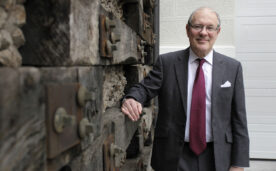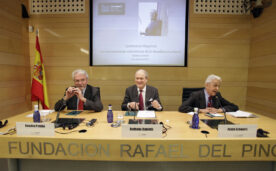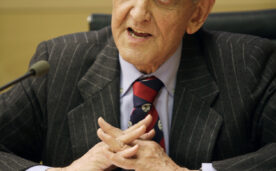On 4 April 2013, the Rafael del Pino Foundation organised the Keynote Lecture by Anthony Daniels "The economic consequences of cultural decadence". Anthony Daniels, philosopher, physician, psychiatrist, world traveller, sociologist, journalist, critic. Dalrymple represents a unique combination of broad and provocative experience, deep education, and impressive literary skill - a kind of perfect storm of intellect.
Anthony Daniels has been arrested as a spy in Gabon, been wanted by South African police for violating apartheid, visited the site of the Liberian government's massacre of civilians, concealed his status as a writer for fear of execution in Equatorial Guinea, infiltrated an English communist group in order to attend the World Youth Festival in North Korea, performed Shakespeare in Afghanistan in the presence of its crown prince, smuggled books for dissidents in Ceausescu's Romania, was arrested and beaten with truncheons for photographing an anti-government demonstration in Albania, was guarded by Indonesian police in East Timor, and crossed Africa and South America using only public transport. Few people have travelled as extensively and as courageously as Dalrymple, who has visited and written about dozens of countries on every continent except Antarctica.
As a political journalist, he began in the 1980s to recount all these experiences in articles for the London Spectator magazine and in six travel books published under his real name, Anthony Daniels. But he was also until recently a full-time doctor, practising as both a physician and a psychiatrist. He was a surgeon's assistant for six months in Rhodesia (now Zimbabwe) and practised medicine in a small village in Tanzania for two years, where he says he treated, among other cases, "children bitten by puff adders" and adults "mauled by leopards". He also worked in a psychiatric clinic in the Gilbert Islands (in the South Pacific) for three years and for 15 years as a prison doctor and psychiatrist in England. In the latter capacity, he has interviewed thousands of criminals and victims of domestic violence, people who have attempted suicide, as well as potential Islamic terrorists, rapists, murderers, drug addicts and burglars. He still continues to serve as an expert witness in British murder cases.
Clearly, Anthony Daniels has realised the intellectual benefits of a career in medicine: talking to diverse groups of people about their problems and learning to diagnose without becoming emotionally involved. This, along with his epic world travels, has given him the ability to weigh the advantages and disadvantages of a multitude of cultures, religions and systems of government, an understanding of life, problems and philosophies of poverty at home and abroad; an experience that has served him well in distinguishing the main features of different cultures and human behaviours, and with a unique point of view from which to reflect on the existence of evil.
In his writings, Daniels draws on his personal experience, deep reflection to produce his line of thought in which he is deeply suspicious of current intellectual fashions. According to Dalrymple, for over a century, Western intellectuals have been concerned not with the identification of truth, but with the abolition of traditional social limits on individual behaviour in order to achieve complete personal licence. In doing so, they have placed the new authority of reason above that of religion, social convention, tradition and etiquette, which restrict individual behaviour and must therefore be destroyed. But the intellectuals' use of reason is not in good faith. They exploit reason in a form of philosophical dispute that excuses almost all possible forms of anti-social behaviour. Thus, academic thinking embraces ever more complex and absurd theory, which replaces simple and impartial observation.
This intellectual line struck Dalrymple when he returned to England from life abroad. In Africa, he had seen real poverty, survival was an achievement of the species, the people still retained their dignity and their work ethic. To his surprise, he discovered that the lives of English slum dwellers were "as saturated with arbitrary violence as those of the inhabitants of more than one dictatorship", with the difference that in the West "evil is freely chosen" rather than being a product of government coercion. He determined that the decline of civility, always advocated by Western intellectuals, had had a disastrous effect on many segments of society and the lower classes where there were more victims of lack of opportunity, as in Dickens' time, but still willing barbarians. Dalrymple's work is a defence of civilisation.
He chose the pseudonym Theodore Dalrymple in 1990 so that he could describe anonymously and in great detail the depravity he witnessed every day in England. In 1994, he began writing for The City Journal, which years later collected many of his essays in Life at the Bottom and Our Culture, What's Left of It (2001 and 2005, respectively). He has also written many other books and essays of social criticism for publications such as National Review, the Telegraph and The New Criterion.







